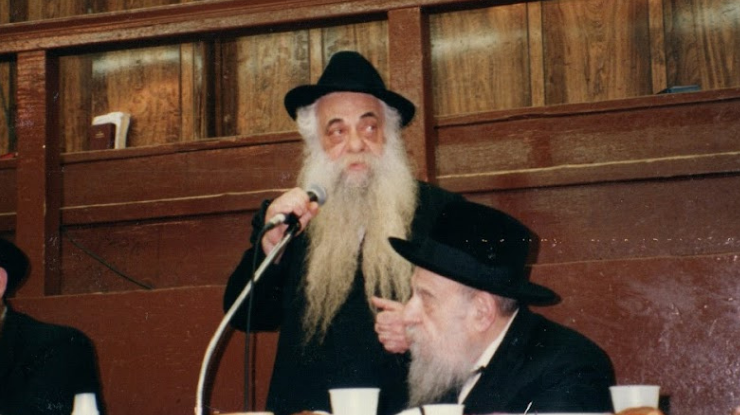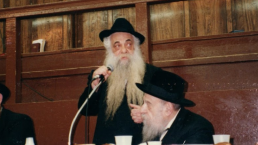Repairing A Sinful World In The Time Of Redemption
BEGIN WITH A GRIN
A frum woman was asked what is the secret to the success of marriages in the frum world. She said, “It’s simple. We sleep separately, we board the bus separately, we eat separately, and dance at weddings separately. In short, we do everything in order to remain together!” • Full Article
BEGIN WITH A GRIN
A frum woman was asked what is the secret to the success of marriages in the frum world.
She said, “It’s simple. We sleep separately, we board the bus separately, we eat separately, and dance at weddings separately. In short, we do everything in order to remain together!”
BEYOND REPAIR?
In this week’s parsha, Ki Seitzei, there are numerous mitzvos. It is the parsha with more mitzvos than any other parsha, 74! There positive and negative mitzvos, mitzvos between man and G-d and man and man, mitzvos that are statutes, testimonies and civil law. Everything is covered.
One of the topics in the parsha is about family life and the sanctity of marriage, how to marry and how to divorce (G-d forbid) and a slew of mitzvos associated with various problems having to do with married life.
This week, we will address one of the most complicated problems in Jewish law, that of mamzerus. In 23:3 it says, “A mamzer (one who is born of a forbidden relationship that has the death penalty attached) shall not enter the assembly of Hashem,” which means a mamzer cannot marry a Jewish-born girl. He can marry another mamzer or a convert, but their descendants will forever be mamzerim. The question is, what will happen with the prohibition of mamzerus in the future. Put another way, will this prohibition continue or will mamzerim be able to be purified in the future?
It’s interesting to note that this discussion about the future of mamzerim is not something new for our generation, the generation of the Geula. It’s an ancient halachic discussion which is sourced in the Tannaim. In the Gemara (Kiddushin 72b), there is a halachic discussion between R’ Yosi and R’ Meir about the future of mamzerim and nessinim (a nation which converted in the time of Yehoshua. Dovid HaMelech decreed that although they are halachic Jews, they cannot marry Jews).
R’ Yosi maintains that mamzerim and nessinim will become pure in the future, while R’ Meir says they won’t. R’ Yosi backs up his view and proves it from a verse in Yechezkel (36:25), “And I will sprinkle pure water on you and you will be purified.” R’ Meir says this verse is about another type of purity, “from all your impurities and all your abominations,” and not from your mamzerus. R’ Yosi has a ready response and he explains that the continuation of the verse, “I will purify you” alludes to another sort of purity, not just from impurity and sin but mamzerus!
R’ Meir quotes another verse (Zecharia 9:6), “v’yoshav mamzer b’Ashdod” (the mamzer will dwell in Ashdod). He says this means that in the Geula, mamzerim will still be kept separate from other Jews and will have to live separately (in Ashdod – sorry to all those who live in Ashdod).
REPAIR, NOT DESPAIR
At the end of the discussion in that Gemara, the Amora, Shmuel paskens the halacha like R’ Yosi, and according to this, mamzerim have a rosy future in the Geula, when restrictions will be lifted.
However, sad to say, this simple topic is not so simple… The Rishonim debate whether this is practical halacha. Ramban (cited in Beis Yosef, Even HaEzer 2) paskens that all types of mamzerim will be granted permissibility in the future, whether they are known by the public as mamzerim or they are not known. The Mordechai maintains that the statement of Shmuel in the Gemara was rejected as the final ruling due to other statements in Shas which seem contradictory. According to the Mordechai, we need to pasken according to Rava (Yevamos 17a) who says that the hereditary disqualification of mamzerus has no rectification, and he goes so far as to frame this quite sharply. In the words of Rava, even those who descend to gehinnom have rectification in the Geula, as it says (Hosheia 13:14), “From the clutches of the nether region I would ransom them, from death I would redeem them,” while mamzerim are hopeless and they will remain prohibited just as they are today.
What do we do with such a dispute? Like whom do we pasken?
A compromise! Other Rishonim (the Ran and the Rosh) try to bridge the two contradictory Talmudic passages and rather than pasken like one or the other, they find an original way to mediate between the two. According to them, all the mamzerim who are unknown to the public to be mamzerim, will be purified and allowed to enter the Jewish people. They maintain that this is what R’ Yosi meant, not to permit all mamzerus but not to publicize that so-and-so is a mamzer and that he can’t marry a Jewish girl.
Although Moshiach will have ruach ha’kodesh and will be able to know who and what they are, he will remain silent about this, as in the psak, “A family that has become absorbed will remain absorbed.” However, those mamzerim who were known to the public to be mamzerim, it’s about them that Rava issued his ruling that they have no recourse and they will remain, unfortunately, in their halachic state. This is how the Shulchan Aruch paskens (Even HaEzer 2,5).
We are in the month of Elul, a month of mercy and Selichos, a month of teshuva. “Nothing stands in the way of teshuva.” As such, it’s important to note and remind ourselves that the infinite power of teshuva can overcome even those things which Jewish law says cannot be fixed. The Gemara (Chagiga 9a) says that the sin of the birth of a mamzer is forever in the category of a “crooked thing which cannot be fixed.” As long as the mamzer remains alive, the crookedness cannot be fixed. The Alter Rebbe (Tanya, end chapter 7) even explains the Gemara logically, “Even if he does tremendous teshuva, he cannot raise the life-force to holiness since it already descended to this world and was encased in the body of a human being.”
But the G-dly light of Chassidus which shines even in the greatest darkness, teaches that everything is possible, even rectifying the sin of mamzerus!
TO CONCLUDE WITH A STORY
We will end with a Chassidic story which is in the introduction of the Rebbe Rayatz to the sefer, Pokeach Ivrim of the Mittler Rebbe.
There was a renowned Chassid from Beshenkowitz named Reb Yosef, who was great in Torah and fear of Heaven. In a yechidus that he had with the Alter Rebbe for a yechidus, the Rebbe told him to marry a woman who was still capable of having children, and that she would give birth to a son. The Rebbe added that Hashem would grant him a long life, and for the sake of his soul he would be better off being a wagon driver than a rav.
It was only a long time later that he actually became a wagon driver, and was known as ‘Reb Yosef Baal Agala’ (the wagon driver). Even in this position, he did not change his previous practice of toiling in Torah most of the hours of the day, and he only devoted a small amount of time to his new profession. Obviously, he didn’t have a lot of customers as only those who were in no rush would consider using his services.
On one of his trips, he arrived in a city in order to spend the night there and continue on his journey. As was his custom, he sat down to learn and daven, and complete his daily quota of study.
One of the other guests in the hotel was a Jew who was distant from a life of Torah and mitzvos, who served as an advisor to the king. This Jew was looking for a wagon to take him on the next leg of his journey and the owner of the inn suggested R’ Yosef. The advisor sought out R’ Yosef and asked him when he would be setting out because he needed to know when to wake up and get himself together for the journey. R’ Yosef answered that they would leave the next day after Shacharis. The man asked what time that would be, and R’ Yosef answered when you finish davening. The man said that he would leave the davening to R’ Yosef, but he himself had no need to pray.
R’ Yosef expressed surprise as to how that could be, since a Jew needs to daven in the morning and Shacharis is also connected to other mitzvos such as tallis and tefillin. The advisor insisted that he didn’t need those things and he asked the innkeeper to wake him a half an hour before departure time.
Meanwhile, R’ Yosef woke up at midnight and carried out his regular custom of reciting Tikkun Chatzos, in which he poured out his heart with weeping. The advisor woke up in a panic in middle of the night to the cries of the wagon driver. The crying pierced his heart and awakened the Jewish spark within. This, in turn, led him to contemplate the course of his life and how far he had distanced himself from G-d, to the point that he joined in the crying and was aroused to a great teshuva out of profound and powerful love for Hashem.
In the morning, the man asked R’ Yosef for his tefillin so that he could put them on and daven. R’ Yosef decided to wait for him to finish his prayers.
The prayer of the advisor, which was accompanied by much crying, weakened him to the point that afterward he fell into bed in extreme exhaustion. R’ Yosef considered what he should do next and decided to wait until the man recovered, because maybe he would need his assistance or his tefillin since he was clearly going through a major awakening to teshuva.
Meanwhile, word got back to the royal court that the advisor was sick and the king sent his personal physician to try to nurse him back to health. The doctor arrived and told those around, how multiple tragedies had befallen this Jew in one fell swoop; he was lying ill and had no idea that he just lost his wife and children in an accident, but due to his severe condition he could not tell him the “terrible news.”
After a few days of administering the medications and following the guidance of the doctor, the man recovered and was overjoyed to find out that R’ Yosef had remained the whole time waiting for him. He requested to speak to R’ Yosef in private and recounted his life story to him. He confessed that he had committed every major transgression in the Torah, including marrying a non-Jewish woman and he had children from her. In his mind, he was beyond repair and could have no rectification since he had brought non-Jewish children into the world. R’ Yosef informed him that G-d had accepted his true repentance and had performed a miracle for him in which he lost his non-Jewish wife and children.
R’ Yosef advised the newly minted “baal teshuva” to travel to the Mittler Rebbe, who was the heir to the throne of the Alter Rebbe, and to receive from him a course of proper repentance and Hashem would surely grant him full forgiveness.
In fact, the Mittler Rebbe wrote the Pokeach Ivrim especially for this baal teshuva.
Good Shabbos!
99
Join ChabadInfo's News Roundup and alerts for the HOTTEST Chabad news and updates!









































